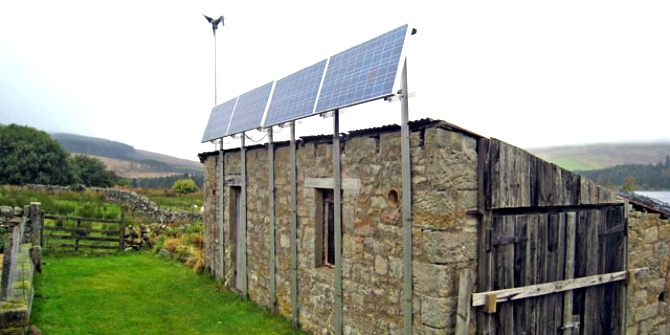
Alexandra-Maria Bocse (LSE) looks at the impact of Brexit on investment in renewables, on energy efficiency and on connections between the EU and the UK energy markets. She writes that the negative implications of Brexit for the UK will require policy responses.
The uncertainty surrounding Brexit made the UK a less attractive market for renewable energy investors. The business and financial sector warned over the last years that Brexit, even if delivered on time, will trigger a certain level of uncertainty and inhibit investment in key sectors. The repeated postponement of the UK departure (indeed, to avoid a no-deal Brexit that would have been very harmful to business and the economy) led to prolonged uncertainty.
Globally, the pressure to decarbonize (and implement in this way the Paris Agreement) coupled with the drop in the price of renewable energy technology led to increasing investment in renewable energy. However, the UK has fallen in international rankings on attractive renewable energy markets. The RECAI (Renewable Energy Country Attractiveness Index) released bi-annually by consultancy EY placed the UK 8th in the rankings released in autumn 2018 and spring 2019, down from the 7th position occupied previously. RECAI includes 40 countries. According to EY, the reduced attractiveness of the UK is generated by Brexit uncertainty, particularly regarding the exports of power to the EU and the terms for importing equipment to the UK.
The postponing of the UK departure date further extended the uncertainty faced by private investors. The UK government and the EU official websites and official communications admit that there will be changes to the energy sector, including the renewable energy sector, when the UK leaves the EU. However, when this departure will take place and what will be the exact changes remain surrounded in mystery. A fluid regulatory environment is not conducive to investments in renewable energy or any energy projects for that matter. At the same time, public funding for renewable energy is scarce. The 2019 UK Autumn Budget did not provide additional funding for renewables. Overall, the UK will need by 2021 £275 billion in investments upgrading its network and replacing existing plants, with a great part of this financing coming usually from abroad, including the EU.

Brexit poses challenges not only to the circulation of capital between the UK and the EU, but also to the trade between the two in energy. The risk of disrupting both the UK and the EU energy markets is high in the context of Brexit. The access of the UK to the EU energy market generates flexibility and reliability of supply for both the UK and EU consumers. For instance, the UK is the third largest importer of electricity from the EU, with all imports coming from other states in the block. Particularly a no-deal Brexit risks to isolate the UK from the EU market, at least temporarily, until alternative arrangements are found. To trade in energy with EU companies, UK market actors ‘will need to register under the Regulation on Energy Market Integrity and Transparency (REMIT) with an EU regulatory authority’, importers of nuclear material from the EU will need an import licence and ‘UK-issued Renewable Guarantees of Origin and Guarantees of Origin for combined heat and power will no longer be recognised in the EU’. All these will cause disruption to both the UK and the EU energy markets.
When it comes to GHGs emission reduction, the UK is well-known for setting ambitious domestic targets, through the Climate Change Act, and then trying to determine the EU and climate-sceptical EU countries to embrace higher EU-wide GHGs emission reduction targets. The EU is looking to reach its emissions reduction targets (by 2030 an overall decrease of 40% compared with 1990 levels) by increasing its energy efficiency by 32.5% (compared to projections) and the share of renewables in its gross final consumption to 32% by 2030. However, the UK is not a firm EU leader on these two issue areas and there is a danger that the UK will dilute its national ambitions concerning the share of renewables in its energy consumption, as well as energy efficiency, after Brexit.
In recent past, EU-level discussions around the Renewable Energy Directive led to conflicts between the UK and Germany. Thanks to the UK opposition, mandatory national targets were dropped from the compromise achieved in October 2014. Renewables were at that point and remain underrepresented in the UK energy mix. In 2016 renewables accounted for 9.3% in gross final energy, while the EU average was 17%. The greener and cheaper energy is the energy that we do not need to use. EU energy efficiency rules, such as the ones reducing vacuum cleaner power (made or sold in the EU) from 1600 watts (W) to 900 W, help increase energy efficiency in the UK. Energy efficiency improvements enabled the regular UK household to save approximately £290/year more in 2016 than in 2008. Documents leaked to the media showed that in 2017, during the debates on the Energy Efficiency Directive, the UK government asked the EU Commission to not go beyond a 27% increase in energy efficiency by 2030 and to not make this target binding on the EU Member States. The target itself would not affect the UK directly as it is due to leave the EU in 2019. The UK position raised concerns among environmental groups, such as Greenpeace, that the Conservative government might dilute domestic energy efficiency policy after Brexit.
The dilution of certain climate and energy policies is possible in the context of important changes in political leadership. We could see this happening in the case of the US after Donald Trump took office and phased out a series of energy and climate policies. The current UK political environment is not meant to reassure us. Recently, prime-minster Theresa May has announced she will step down from her post. This will enhance the Brexit chaos and increase the uncertainty surrounding the entire process. Some of the strong contenders for the role of Conservative leader are also strong supporters of Brexit and not the most determined supporters, if not deniers, of the climate cause. Boris Johnson, one of the popular choices to replace Theresa May, is known to have cast doubt on climate change being trigger by human action, despite the scientific community reaching consensus on this. Other politicians that enjoy the support of the British electorate are equally reluctant to act on climate. In his May 2019 intervention on BBC, Nigel Farage was critical of British action on climate.
A UK out of the EU and led by Eurosceptics and climate deniers might dilute current energy efficiency standards and be less willing to support renewable energy investment. However, the EU and the UK energy markets remain interconnected, with the UK most likely continuing to import electricity and nuclear fuel from the EU and investors in both the UK and the EU wanting to maintain access to invest. The impact of Brexit on the UK energy sector and the cooperation between the UK and the EU in this field will be decided by the future EU-UK trade and energy deals. The Political Declaration released in November 2018 provides for close ties between the EU and the UK in the field of energy, but it remains to be seen if such terms will be preserved in future negotiations.
This post represents the views of the author and not those of the Brexit blog, nor the LSE. Image copyright Oliver Dixon and licensed for reuse under this Creative Commons Licence.
Alexandra-Maria Bocse is a Fellow at the Department of International Relations at the London School of Economics and Political Science.






